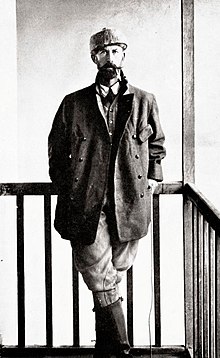Percy Harrison Fawcett
| Percy Fawcett | |
|---|---|

Fawcett in 1911
|
|
| Born |
Percy Harrison Fawcett 18 August 1867 Torquay, Devon, United Kingdom |
| Disappeared | 29 May 1925 (aged 57) Mato Grosso, Brazil |
| Occupation | Artillery officer, archaeologist, explorer |
| Military career | |
| Allegiance | United Kingdom |
| Service/branch | British Army |
| Years of service | 1886–1910 c.1914–1919 |
| Rank | Lieutenant Colonel |
| Unit | Royal Artillery |
| Battles/wars | World War I |
| Awards |
Distinguished Service Order 3 × Mentioned in despatches |
Lieutenant Colonel Percival Harrison Fawcett DSO (18 August 1867 – during or after 1925) was a British geographer, artillery officer, cartographer, archaeologist and explorer of South America. Along with his eldest son, Fawcett disappeared in 1925 during an expedition to find "Z" – his name for an ancient lost city, which he and others believed to exist and to be the remains of El Dorado, in the jungles of Brazil.
Percy Fawcett was born on 18 August 1867 in Torquay, Devon, England, to Edward Boyd Fawcett and Myra Elizabeth (née MacDougall). He received his education at Newton Abbot Proprietary College along with Bertram Fletcher Robinson. Percy Fawcett's India-born father was a Fellow of the Royal Geographical Society (RGS). His elder brother Edward Douglas Fawcett (1866–1960) was a mountain climber, Eastern occultist and author of philosophical books and popular adventure novels.
Fawcett attended the Royal Military Academy, Woolwich as a cadet, being commissioned as a lieutenant of the Royal Artillery on 24 July 1886. On 13 January 1896 he was appointed adjutant of the 1st Cornwall (Duke of Cornwall's) Artillery Volunteers, and was promoted to captain on 15 June 1897. He later served in Trincomalee, Ceylon, where he also met his future wife Nina Agnes Paterson, who he married in January 1901 after having previously ended their engagement. They had two sons, Jack (born 1903) and Brian (1906–1984). He joined the RGS himself in 1901 in order to study surveying and mapmaking. Later, he worked for the British Secret Service in North Africa while pursuing the surveyor's craft. He served for the war office on Spike Island, County Cork from 1903 to 1906, where he was promoted to major on 11 January 1905. He became friends with authors H. Rider Haggard and Arthur Conan Doyle; the latter used Fawcett's Amazonian field reports as an inspiration for his novel, The Lost World.
...
Wikipedia
